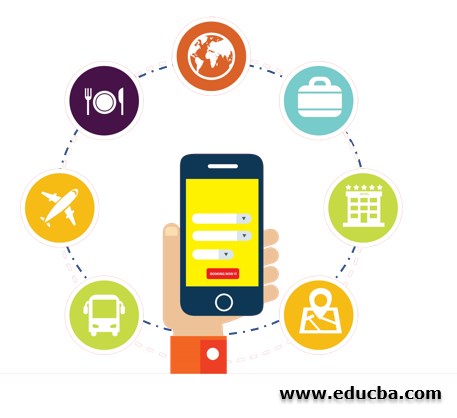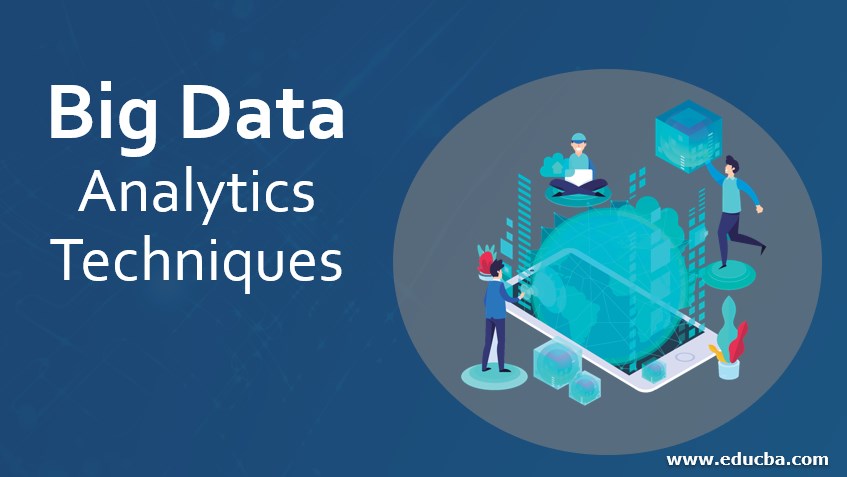Updated June 2, 2023
Introduction to Big Data Analytics Techniques
In this Topic, we will learn about Big Data Analytics techniques. With immense potential, the hospitality sector is growing rapidly nationally and globally. As this sector expands in diverse directions, there is a growing adaption of technology and resources across this sector. Built at a regional, national, and local level, a number of sectors comprise the hospitality sector. Hotels and restaurants are the main part of this sector and contribute greatly to their profit.
Tourism and hospitality are often considered the same and often overlap each other. However, these are two distinct industries, though they are related. Tourism is people who generally go outside their usual environment for less than a year. These people travel typically for either business or pleasure. In contrast, hospitality provides accommodations, venues, meals, and other facilities to people outside their homes. This means that tourism is not a hospitality industry sector. It is just a source through which tourists fulfill their needs and expectations. Some sectors that are a part of the hospitality industry include clubs, food shops, catering, exhibitions, fair organizer activities, and other food services.
Hospitality is a focal point in many countries worldwide, but it is particularly important in countries where tourism is a major export industry. This means that when people travel across borders, the hospitality industry flourishes. That is why they are the main source of foreign currency exchange and employ a sizeable population. By bringing together different cultures globally, the hospitality sector can considerably help countries increase their revenue and foreign exchange.
Image source: pixabay.comHotels and restaurants are an integral part of the hospitality sector. They are responsible for providing a wide range of big data analytics services to their customers and clients. But with growing numbers of hotels and restaurants across all categories, it becomes difficult to stand out. That is why it is important to use all the opportunities you come across because standing out in the hospitality sector. This requires continuous hard work and effort. The hospitality sector can surpass competitors by offering impeccable customer care, efficient operations, and improved technology. With technological advancements in the hospitality sector, small and mid-level hotels must take this opportunity to enhance their offerings strategically and comprehensively.
Technology Trends in Hospitality Sector
Here are some technology trends that the hospitality sector must adapt to in these changing times.
-
The importance of social media marketing and its effects on customer care:
Marketing professionals of a hotel are trained to attract a maximum number of customers and thereby help increase profits substantially. Hotels must learn new and innovative ways to reach their target audience. Today digital media has the power to engage and connect with the audience across national and international locations. One of the fastest and most powerful digital media tools is social media. According to a recent survey of Worldwide Social Network Users in 2013, more than 20 percent of the world’s population uses some form of social media or other regularly. This number may increase in the coming years. Social media is one of the most powerful drivers in the coming years.
Any hospitality business should use digital mediums to connect with its customers to stay ahead in the market. Instead of using marketing campaigns for decades, the hospitality industry must use the internet to provide valuable information about their services and products to their target audience. Being active on social media can sometimes backfire, as customers can use this medium to complain about their services. So the hospitality sector must be ready to promptly and sustainably answer the questions of the customers. By being accountable for their services, hotels and restaurants can develop higher customer expectations and desires trends.

-
Create systems for intelligently integrating into the management system of hotels:
Hotels and restaurants are completely based on customer relationships. And this means these sectors will have had some customer relationship management system for years. However, these systems must be updated at regular intervals and integrated with the existing systems as well. Integrated, technologically advanced management systems are one of the main ways hotels can provide customers with improved and enhanced services.
For example, when booking hotel rooms, customers can personalize their stay through options like welcome drink, room temperature, and television facilities in the room. Once the customer data has been entered into the database, hotels can create personalized experiences for the customers. This will make their stay memorable and unforgettable in the true sense. This is an important way hotels can connect with their customers. Because personalized experiences are something that helps big data analytics techniques retain and expand their customer base.
-
Adapt mobile devices so that they can generate better accessibility:
Today desktops are gaining less popularity because mobile devices can perform all functions than desktop computers. Even brands are looking at mobile devices to help them to connect with customers, clients, and partners effectively. Today, tablets and mobile phones are the mediums through which brands can take their connection to the next level. Many hospitality-related brands now find that smartphones fit their strategic vision, operational methods, and budgets better than traditional computers. For instance, concierge professionals can effectively engage and connect with their guests from any place on the property and take care of their needs in real time when they have access to fast smartphone devices. In addition, smartphones are more often cost-effective than purchasing and maintaining desktop computers.
How can data analytics help hotels expand their reach effectively yet strategically?
With growing reach, the hospitality sector caters to nearly millions of travelers daily. Each customer has its expectations and desires, making it difficult for hotels to meet them sustainably. At the same time, it is important to understand that these expectations are important for retaining the customer base of the hotel. Data analytics can systematically help brands across the hospitality sector meet their goals and aspirations. And although many marketing professionals will not admit this fact, not all customers are equal to hotel owners. Some will check in and out of the hotel without much of a problem and use a minimum of their services. Others will spend thousands of dollars on fine dining, beauty treatments, and other activities.
Therefore, the latter customers are valuable and a bigger investment for the hotel brands. Identifying these customers is extremely important for hotel brands and restaurants, but it becomes difficult for hotels to track them through a single visit. For example, consider two different customers. One may come to the hotel and spend his entire earnings on a lifetime holiday idea. At the same time, another customer will spend very little on extra services but regularly comes to the hotel. Therefore he is a higher long-term value for the hotel. Big data analytics techniques can help hotels to make this distinction in an effective manner.

Another area where analytics can help brands is yield management. There are big data analytics techniques by which hotels can understand the optimum value of a room. They can consider factors like peak demand season, weather and local events, and the number of guests that check in during a particular period. Big data analytics techniques can help hotels in all these areas. Even though their adoption is less in comparison to the retail and manufacturing sector, this can soon change in the coming times in big hotels and restaurants. A great example of these big data analytics techniques depicted in 2013/14 is when US economy hotel chain Red Roof Inn took advantage of the record-setting winter, resulting in flight cancellations.
As many passengers were stranded daily, the hotel can use analytics to identify publicly available public database systems on weather conditions and flight cancellations. So that they could target this section of their customers by offering them hotel and room services. As a number of people would be on mobile phones to search for hotels, this chain of hotels used mobile marketing campaigns to increase their business and profit margins. Another example of using big data analytics techniques has been done by Denihan Hospitality which has a number of boutique hotels across America. By integrating transactional and customer reviews and feedback, the company creates an effective dashboard to understand consumer expectations and desires effectively. This allowed the hotel brand to make more data-driven decisions catering to customers, from business to leisure travelers.
Understanding and fulfilling the customers’ needs is one way the hotel brand tried to capture and integrate its goals with customer expectations. Further, the hotel brand can submit the analytic reports to their staff, who could easily anticipate the consumer needs through a click on their phone. Housekeeping staff could receive real-time updates about the needs of the customers and fulfill them without any issues or problems. As mentioned above, customer relationships are an integral part of the success of any hotel brand. They must focus on ensuring better returns and profits for customers. Big data analytics techniques provide hotels with direct and important data that can help big data analytics companies achieve that goal successfully.
Along with other industries, hotel brands and restaurants have to use their analytical data to create marketing campaigns that are innovative, inventive, and, above all, personal. Personalized marketing is the only way hotel companies can reach their audience to connect and engages with them. Creating emails or targeted social media plans are crucial tools to help hotel brands use and target the information to the right audience. This involves analyzing information about customers that visit the hotel, gathering customer feedback, and using the loyalty programs of their party to effectively connect with the target audience through plans that perfectly fit the needs of the consumers. These plans can be free breakfast or dinner to a ticket for an entertainment program. These strategies can effectively increase the bookings and engagements of customers across all levels.
The future of big data analytics techniques in the hospitality sector
Big data analytics techniques still have a long way to go before they become an integral part of the hospitality sector. The volume of data available to this sector is unlimited, so immense potential and opportunity are available here compared to other sectors. In the hotel industry, customers leave a data trail when they check in. These can easily be used and converted into insights helping hotel brands understand and empower their customer base in the true sense.
In conclusion, big data analytics techniques change how businesses and brands perform their functions across all sectors and economies. Very soon, they will become an important aspect of the functioning of the hospitality sector. They provide hotel brands with limitless opportunities to grow their customer locally and nationally. This rings true for almost every brand within the hospitality sector, from the big established chains to the small hotels and restaurants in every nook and corner.
Recommended Articles
This article has been a guide to Big data analytics techniques. Here we have discussed the basic concept, Technology Trends in the Hospitality Sector, along with the future of big data. You may also look at the following articles to learn more –





